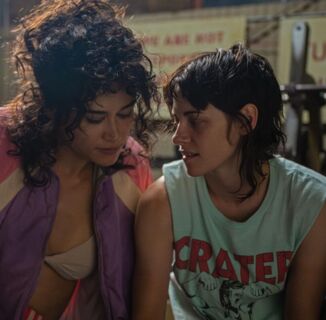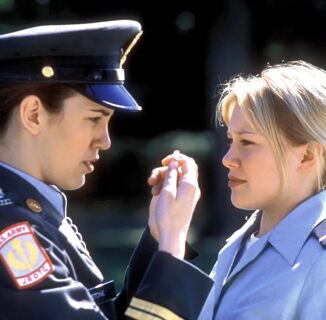“John” and I met at a jerk-off party in Manhattan. I recognized him immediately from his litany of roles on film and TV, but, like any good New Yorker, I pretended I didn’t. He looked me dead in the eyes while he talked me through exactly how to stroke his cock: swiftly, gently, like silk.
When, a few months later, I saw that we had mutual friends on Facebook, I sent him a friend request, expecting nothing. He accepted it minutes later, dirty-talking me right out of the gate. Unsure of whether he’d recognized me from the party, I eventually put it out there, at which point the tonality shifted. He insisted that I save his number in my phone as “John,” that this all had to be secret.
I kept in touch with John over the coming weeks, planning in stages to play with him at his apartment. He told me his kinks, and I kept an open mind, dizzy from the attention and power he’d so quickly given over to me. I thought fame must be especially lonely, and I wanted to make him feel seen and cared for. I wanted to meet him where he was: as a horny dude trying to catch a butthole like the rest of us.
The day of the hookup came. I began to feel nauseated at workI wasn’t sure why. I talked it out with my therapist and realized that my planning with John had been entirely about his pleasure on his terms. Why had I kept it going if there had been no room for my desire in John’s fantasy? Was I acting out a desire to punish someone with more power than me? Or had I simply been susceptible to his brand of seduction, an unwitting participant in someone else’s psychodrama?
I texted John on my way out of my therapist’s office, asking for a rain check, saying I didn’t feel well, which was true. For the rest of the afternoon and evening, John barraged me with guilt trips, the first two or three of which I responded to with apology. He railed on about my inconsideration, his disappointment, how our relationshipwhich I’d thought was just a casual flingwas irrevocably done for, on and on. John’s dramatic response to my last-minute cancellation was certainly heightened by the fact that he was a celebrity, but it was by no means unfamiliar.
I grew up in a puritanical household in which my pastor dad’s favorite pastime was preaching Jonathan Edwards’ “Sinners in the Hands of an Angry God,” and I’m German in heritagewhich is to say, I’m preternaturally conscious of commitments. I’ve had my share of anxiety breakdowns when friends or lovers are late to dates or negligent in responding to texts or voicemails promptly. For a few years in my mid-twenties, my watchcry was, “I don’t wait more than 15 minutes for anybody.”
But the Teutonic, oppressive expectations of society reach beyond my own, personal responsibility. New York living, in particular, puts incredible pressure on queer people to show up no matter what. There have been months in my life when, unable to afford a MetroCard, I walked six miles (in the snow, in sneakers) both directions to a job that paid $13 an hour and ate office snacks as my main source of food.
Judith Butler writes, in Frames of War, “There is no life without the conditions of life that variably sustain life, and those conditions are pervasively social, establishing not the discrete ontology of the person, but rather the interdependency of persons[…].” Our lives, when understood to be utterly vulnerable, don’t end at our skinthey include each other.
It would be grossly reductive to plumb the depths of Butler’s work simply for nuggets of wisdom, but her notion of a permeable, social selfhood has consequences for our thinking around getting our needs met. It’s no mistake, for instance, that when I have a hard time finding a reason to take a shower in the morning, I scour the Internet for tips on “self care.” We’re obsessed with what we’re able to do all by ourselves.
Which brings us to sex.
My brush with John helped me see how sex can facilitate a reckoning with our inescapable vulnerabilityeven in the moments when we believe ourselves to be hiding it bestby showing us who we are in relationship with others. I wrote him off at the time as a rich, entitled brat, accustomed to getting everything he wanted, and his reaction as a temper tantrum in response to being denied for once. In retrospect, it’s more honest to say that I was staring down my own deeply held ideas about my own agencynamely, that the only way I could wield my power relative to John was to cut off the possibility of sex with him altogether. It would be easy for me to castigate myself for doing wrong by him, but at the time, the fact that I was able to allow my feelings of uncertainty to surface at alleven late in the gamewas progress.
Alexithymia is a condition in which a person has trouble connecting the inner felt experience of the body to words. For instance, the state of hunger for most people involves feelings in the gut; emotions like annoyance, tiredness, and crankiness; and the thought, “I’m hungry” if the body goes too long without food. A person with alexithymia, on the other hand, may not be as sensitive to feelings in the gut, may not be as present to emotions, and may not ultimately register that the physiological and emotional crisis at hand has anything to do with needing something to eat.
Alexithymia is a hallmark of PTSD, one that’s kept me awake past the point of exhaustion on many nights, tamped down my anger, and blinded me to red flags in relationships. It’s not uncommon for alexithymics to experience feelings as ailmentsthe body needs to tell the brain somehow, if not verbally, and I often get sick when I’m up against feelings I can’t consciously feel. In the case of my almost-fling with John, I wasn’t aware of my misgivings until the day of our hookup, which I felt as tummy trouble. If I’d been dishonest with him, I can forgive myself now for not being conscious of it.
I don’t mean to suggest that every broken commitment in the long history of dashed queer hopes is the result of complex PTSD and its many facetsnor should our friends, lovers, and fuckbuddies get unlimited free passes to drop the ball. But I do think there’s something to be gained from cultivating compassion around what we impulsively chalk up to “flakiness.” If it’s true that selfhood goes beyond my skinthat I’m made real and animated by interdependence with othersis it then possible for me to come to an understanding that someone’s decision to “flake” could be taking place at the edge of that person’s growing self-awareness?
In other words, could it be that they’re doing their best to act out of authenticity, the cultivation of which benefits me, too?
On one hand, I wish I could say that, a year after John, I’ve gained enough emotional intelligence to permanently forestall my need to flake, or that the extremity of John’s freakout has put my own intolerance of other people’s flakiness to bed for good. On the other, it seems more and more obvious to me that none of us can ever hope to meet every one of the demands that come at us from all directions.
Sometimes we learn the value of our commitments best when we break them.
Help make sure LGBTQ+ stories are being told...
We can't rely on mainstream media to tell our stories. That's why we don't lock our articles behind a paywall. Will you support our mission with a contribution today?
Cancel anytime · Proudly LGBTQ+ owned and operated
Read More in Culture
The Latest on INTO
Subscribe to get a twice-weekly dose of queer news, updates, and insights from the INTO team.
in Your Inbox













